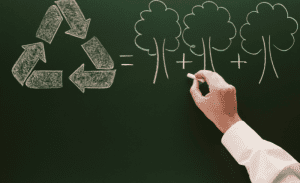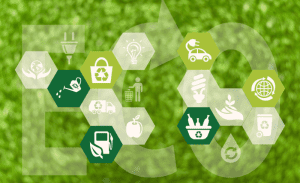Environmental Education is key to raising awareness in society about the importance of environmental protection and the responsible use of natural resources. Every January 26, World Environmental Education Day reminds us that training and information are essential to building a sustainable future. In this article, we will explore the principles of Environmental Education, its impact on waste management and how TMA contributes to greater environmental awareness.
WITHOUT ENVIRONMENTAL EDUCATION, THERE IS NO SUSTAINABILITY: KEYS TO A SUSTAINABLE FUTURE
January 26 is World Environmental Education Day, a key date to raise awareness about the need to promote respect and protection of the environment.
Environmental Education involves informing about ecological problems but also promoting a responsible and active attitude towards sustainability, promoting sustainable habits in responsible consumption and efficient waste management, both for companies and individuals.
WORLD ENVIRONMENTAL EDUCATION DAY: CHALLENGES AND OPPORTUNITIES
World Environmental Education Day has several key objectives that seek to motivate people to get more involved in protecting the environment.

-
- Raise awareness about environmental issues: Help everyone realize the problems facing the planet, such as pollution or climate change. An example would be to talk about how plastics affect the oceans.
- Encourage active participation: It is not only important to care, but also to act. This can include small daily actions such as recycling, reducing water consumption or participating in community clean-up activities.
- Promote sustainable development: Make sure that economic progress takes into account environmental care and social well-being. For example, support the use of renewable energy, such as solar, to reduce the carbon footprint.
- Boost commitment to caring for the planet: World Environmental Education Day seeks to get us all to commit to doing something positive for the planet, such as planting trees or reducing food waste.
- Foster responsible attitudes: Develop a sense of responsibility, so that people understand that every action counts. An example is when someone recycles at home, not just for convenience, but because they know they are helping the planet.
- Develop environmental problem-solving skills: Provide tools to identify and solve environmental problems. An example would be teaching how to reduce the use of plastics and use more sustainable alternatives.
- Promote a comprehensive approach to sustainable development: Teach that economic progress must go hand in hand with respect for the environment and the well-being of all. Such as when a company decides to invest in responsible practices, which are not only profitable, but also environmentally friendly.
WHY ENVIRONMENTAL EDUCATION IS SO IMPORTANT
Environmental Education is key to building a more sustainable future and helps us understand the magnitude of current ecological problems and also gives us the tools necessary to act and generate positive change.
From the impact of our daily decisions to the role of companies in reducing waste, learning about the environment is the first step towards a more conscious and responsible society.
How Environmental Education is key to a future without waste
-
- Awareness of environmental impact: Education is the first step for people to understand how their actions affect the planet.
- Changing habits and responsible consumption: Through learning, habits can be changed towards more sustainable practices.
- Promoting the Circular Economy: With a better understanding of recycling and reuse, waste generation can be reduced and the use of resources can be maximized.
- Generating green jobs: Sectors such as waste management and renewable energy depend on informed and committed citizens.
COMPLETE GUIDE TO ENVIRONMENTAL EDUCATION: GOOD PRACTICES FOR COMPANIES AND INDIVIDUALS
Key strategies for Environmental Education in companies

-
- Implement environmental training programs for employees: Include workshops and information sessions on sustainability and environmental management.
- Establish waste reduction policies in offices and workplaces: Apply practices such as paper reduction and waste sorting.
- Provide adequate containers for waste separation: Place suitable, visible and accessible recycling containers and packaging in all areas.
- Reduce the use of disposable plastics and opt for recycled materials: Promote the use of sustainable alternatives in offices and dining areas and in all types of companies where possible such as cafeterias, restaurants…
- Promote the Circular Economy through reuse and recycling: promote internal communication regarding recycling and reuse of office materials and products.
- Manage electrical and electronic waste (WEEE) correctly: Establish an appropriate system for collecting and recycling electronic equipment.
- Conduct environmental audits to assess corporate sustainability: Audit the environmental impact of operations and look for areas for improvement.
- Create environmental awareness campaigns within the company: Use posters, emails and talks to raise awareness among staff.
- Invest in carbon offset or reforestation projects: Collaborate with organizations to mitigate CO2 emissions.
- Establish alliances with waste management companies: Work with suppliers to ensure proper waste management and disposal.
- Reduce paper consumption through digitalization: Encourage the transition to electronic documents and digital signatures.
- Promote sustainable transport among employees: Encourage the use of public transport, bicycles or electric vehicles through discounts or infrastructure.
- Acquire a sustainable fleet of corporate vehicles: Opt for hybrid or electric vehicles for the company fleet.
- Use renewable energy for energy supply: Install solar panels or contract green energy.
- Incorporate environmental criteria into supplier selection: Evaluate suppliers based on their sustainable practices.
- Create green spaces in the workplace: Improve air quality and promote employee well-being through gardens and plants in the facilities.
Practical environmental education tips for the home and everyday life

-
- Reduce, reuse and recycle: Encourage waste separation at home and the purchase of reusable products.
- Use reusable bags instead of plastic bags: Use cloth bags for shopping and avoid single-use bags.
- Opt for products with less packaging: Choose products in bulk or with recyclable packaging.
- Participate in community clean-up and reforestation activities: Collaborate in local events that contribute to the preservation of the environment.
- Save water by turning off the tap while brushing your teeth or showering: Promote efficient use of water in daily routines.
- Avoid food waste: Plan purchases and meals to reduce waste. Use food scraps for new recipes or compost organic waste.
- Choose energy-efficient appliances: Buy products with an A+++ energy rating to reduce energy consumption.
- Turn off lights and unplug electronic devices when not in use: Implement energy-saving habits at home.
- Inform yourself and educate others about caring for the environment: Share useful information about sustainability with friends and family.
- Use sustainable means of transport: Choose to walk, use bicycles or public transport instead of cars.
- Separate waste correctly at home: Have specific containers for recycling plastic, glass, paper, and organic waste.
- Buy ecological and fair trade products: Choose products that respect human rights and the environment.
- Use compost to reduce organic waste: Create compost at home to use food scraps and reduce garbage.
- Save energy with LED light bulbs and efficient appliances: Replace incandescent light bulbs with LEDs and appliances with low-consumption versions.
HOW DOES ENVIRONMENTAL EDUCATION IMPACT PEOPLE’S LIVES?
Environmental Education reduces the carbon footprint
Environmental Education has had a significant impact on the daily lives of people in several countries, promoting behavioral changes and encouraging more sustainable practices that have contributed to reducing the carbon footprint.

Changes in daily behavior
Environmental Education has encouraged changes in individual and collective behavior:
-
- Recycling and reuse: Environmental Education promotes the adoption of sustainable practices such as the correct separation of waste, recycling, energy and water conservation, and the reduction of waste and food waste.
- Responsible consumption: There has been greater awareness of the importance of reducing consumption and choosing more sustainable products.
- Saving energy and water: Environmental Education has encouraged resource conservation practices at home, such as reducing energy consumption and responsible use of water.
Community Engagement
-
- Environmental Volunteering: More people of all ages are getting involved in local initiatives such as beach and park cleanups, reforestation campaigns, and educational workshops.
- Activism: Environmental Education has encouraged citizens to promote sustainable policies and become agents of change in their communities.
Impact on Schools
-
- Environmental Awareness: Students develop a deeper understanding of the relationship between people and the environment, allowing them to make more informed and responsible decisions.
- Sustainable Practices: Students learn and implement sustainable practices in their daily lives, such as conserving energy and water, and reducing waste.
- Connecting with Nature: In increasingly urbanized societies, Environmental Education has helped students reconnect with the natural environment and appreciate biodiversity.
Developing Skills for Green Jobs
Environmental Education is preparing young people for jobs related to the green economy:
-
- Technical-vocational and higher education programs that develop skills for green jobs are expanding.
- Education in science, technology, engineering and mathematics (STEM) is being strengthened to train qualified professionals for green jobs.
These efforts in Environmental Education are contributing to creating a more conscious and active society in protecting the environment, which in turn helps to reduce the carbon footprint at an individual and collective level and to promote a more sustainable future in the long term.
THE IMPORTANCE OF ENVIRONMENTAL EDUCATION IN WASTE MANAGEMENT
Proper waste management is one of the fundamental pillars of Environmental Education, since waste generation is a global challenge.

Municipal solid waste generation is projected to increase from 2.3 billion tonnes in 2023 to 3.8 billion tonnes in 2050 – a 56% increase in a single generation or less.
When the hidden costs of pollution, ill health and climate change resulting from poor waste disposal practices are taken into account, the cost rises to US$361 billion. Without urgent waste management action, this global annual cost could almost double by 2050 to a staggering US$640.3 billion.
Source: United Nations Environment Programme (UNEP). Study: Global Waste Management Outlook 2024 (UNEP)
Every day we produce tons of waste which, if not managed properly, can have a negative impact on the environment, contributing to air, water and soil pollution.
Correct sorting, reduction and recycling of waste is essential to minimise this impact and contributes to promoting the circular economy, where materials are reused and valued, reducing the need to extract new natural resources. This is one of the keys to combating climate change and moving towards a more sustainable model.
HOW DOES TMA PROMOTE ENVIRONMENTAL EDUCATION?
At TMA, Environmental Education and waste management go hand in hand. Through our efficient waste management solutions, we work to promote sustainability and foster a cleaner and more responsible environment.
Through the implementation of innovative and sustainable solutions, we work to ensure that waste is collected, transported and treated responsibly, contributing to the reduction of pollution throughout the waste management process and promoting recycling and recovery in all sectors.
With a focus on the Circular Economy, we reduce the environmental impact from the root, minimizing the generation of waste and maximizing its reuse.
We are committed to the Zero Waste philosophy, promoting processes that prioritize reduction, reuse and recycling to transform waste into new resources and reducing waste generation in all phases of our processes.
Thanks to waste recovery, we are able to give many of these materials a second life, turning them into new raw materials and avoiding their waste.
In addition, we optimize our operations to make them increasingly sustainable. We implement a fleet of low-emission vehicles and design efficient collection routes, reducing the carbon footprint of our journeys.
All of this allows us to manage waste responsibly and contribute to a more efficient and sustainable life cycle of materials.
At TMA, we understand that efficient waste management protects the environment and helps create greater environmental awareness in companies and citizens.
Every action counts and every small change adds up. Together we can make better use of resources, give them a new life and transform environmental challenges into sustainable solutions.
We take care of our clients and we take care of the environment.
We are much more than comprehensive waste management.
Do you need efficient waste management or more information about the services we offer at TMA? Write to us at comercial@tma.es and we will be happy to provide you with a personalized proposal, fully adapted to your needs.
Discover our comprehensive Waste Management Services.
Follow us on TMA’s LinkedIn. Subscribe to our YouTube channel.
Contact us, we will be happy to advise and inform you.




